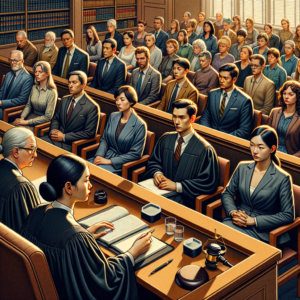Governor Vetoes: A Shocking Disruption of Legislative Progress
In a political landscape often characterized by partisan divides and contentious debates, the role of the governor in shaping legislative outcomes cannot be overstated. This year, a series of high-profile vetoes by governors across the nation has sparked significant discussion about the implications for legislative progress and public policy. As state legislatures grapple with the fallout from these decisions, understanding the nuances of governor vetoes becomes crucial for both lawmakers and constituents alike.
Understanding the Role of Governor Vetoes in the Legislative Process
Governor vetoes serve as a critical check within the legislative process, allowing state executives to reject bills passed by the legislature. This power is enshrined in the constitutions of most states, reflecting the balance of authority between the legislative and executive branches. Vetoes can be absolute, preventing a bill from becoming law, or they can be line-item, allowing governors to reject specific provisions while approving others. This mechanism not only empowers governors to influence policy outcomes but also serves as a tool for accountability, compelling legislators to consider the governor's priorities and concerns when drafting legislation. The veto process is often seen as a reflection of the political climate, where partisan alignment or opposition can significantly affect the fate of proposed laws.
Recent Vetoes: An Overview of Key Legislation Affected This Year
In 2023, several notable vetoes have drawn attention, highlighting the contentious nature of state governance. Among the most significant was the veto of a comprehensive education reform bill in a midwestern state, which aimed to increase funding for public schools and expand access to early childhood education. The governor's rejection of this bill was met with widespread dismay from educators and parents alike, who argued that it would hinder progress in addressing educational disparities. Additionally, a controversial environmental regulation bill aimed at reducing carbon emissions faced a similar fate, with the governor citing concerns over economic impacts. These vetoes, among others, have underscored the challenges faced by legislators in advancing their agendas amid a polarized political landscape.
The Impact of Vetoes on Legislative Progress and Public Policy
The impact of gubernatorial vetoes on legislative progress can be profound, often stalling initiatives that have garnered significant support within the legislature. When a governor vetoes a bill, it not only halts the specific legislation but can also create a chilling effect on future proposals, as legislators may become hesitant to invest time and resources into initiatives that could face similar fates. This disruption can lead to a stagnation of public policy, particularly in areas where timely action is critical, such as healthcare, education, and environmental protection. Furthermore, the frequency of vetoes can exacerbate partisan tensions, leading to a cycle of retaliation where legislators respond by proposing more extreme measures, further polarizing the political discourse.
Analyzing the Reasons Behind Recent Governor Veto Decisions
The reasons behind recent veto decisions are often multifaceted, reflecting a combination of political strategy, ideological beliefs, and constituent pressures. In many cases, governors have cited fiscal concerns as a primary rationale for their vetoes, arguing that proposed legislation could impose undue financial burdens on state budgets. Additionally, ideological differences play a significant role, with governors using their veto power to uphold their party's platform and values. For instance, a governor from a conservative background may reject progressive legislation aimed at expanding social services, while a liberal governor may oppose measures perceived as infringing on civil rights. Understanding these motivations is essential for legislators seeking to navigate the complexities of the legislative process and build coalitions that can withstand gubernatorial scrutiny.
Responses from Legislators: Strategies to Overcome Vetoes
In response to recent vetoes, legislators are employing a variety of strategies to overcome these obstacles and advance their legislative agendas. One common approach is to engage in bipartisan negotiations, seeking common ground with the governor to craft compromise legislation that addresses the concerns leading to vetoes. Additionally, some lawmakers are exploring the possibility of overriding vetoes, a process that requires a supermajority vote in both legislative chambers. This strategy, while challenging, can serve as a powerful statement of legislative intent and public support. Furthermore, advocacy groups and constituents are increasingly mobilizing to apply pressure on governors, utilizing grassroots campaigns and public demonstrations to highlight the importance of specific issues and encourage reconsideration of vetoed bills.
Future Implications: How Vetoes Shape Legislative Dynamics and Governance
The implications of gubernatorial vetoes extend beyond immediate legislative outcomes, shaping the broader dynamics of governance and political engagement. As governors exercise their veto power, they not only influence specific policy areas but also set precedents for future legislative interactions. The frequency and nature of vetoes can signal to constituents and lawmakers alike the priorities of the executive branch, potentially shifting public opinion and electoral outcomes. Moreover, as states continue to grapple with pressing issues such as climate change, healthcare reform, and social justice, the interplay between governors and legislatures will be critical in determining the effectiveness and responsiveness of state governance. The evolving landscape of vetoes will undoubtedly play a pivotal role in shaping the future of legislative dynamics across the nation.
As the political climate continues to evolve, the significance of governor vetoes remains a critical aspect of the legislative process. The recent wave of vetoes has not only disrupted legislative progress but has also ignited discussions about the balance of power, accountability, and the future of public policy. As legislators adapt to these challenges, the ongoing dialogue surrounding vetoes will be essential in navigating the complexities of governance and ensuring that the voices of constituents are heard in the halls of power.
